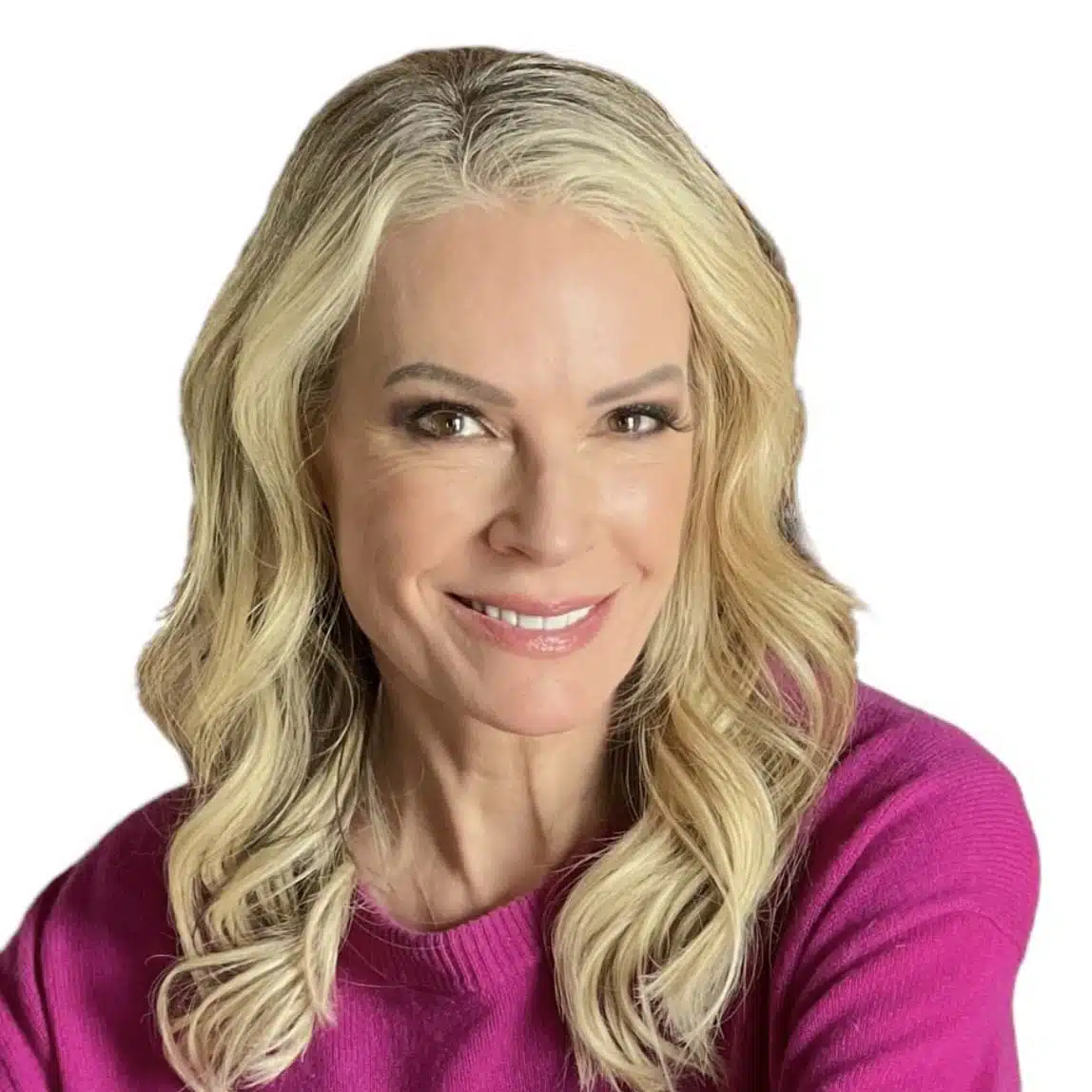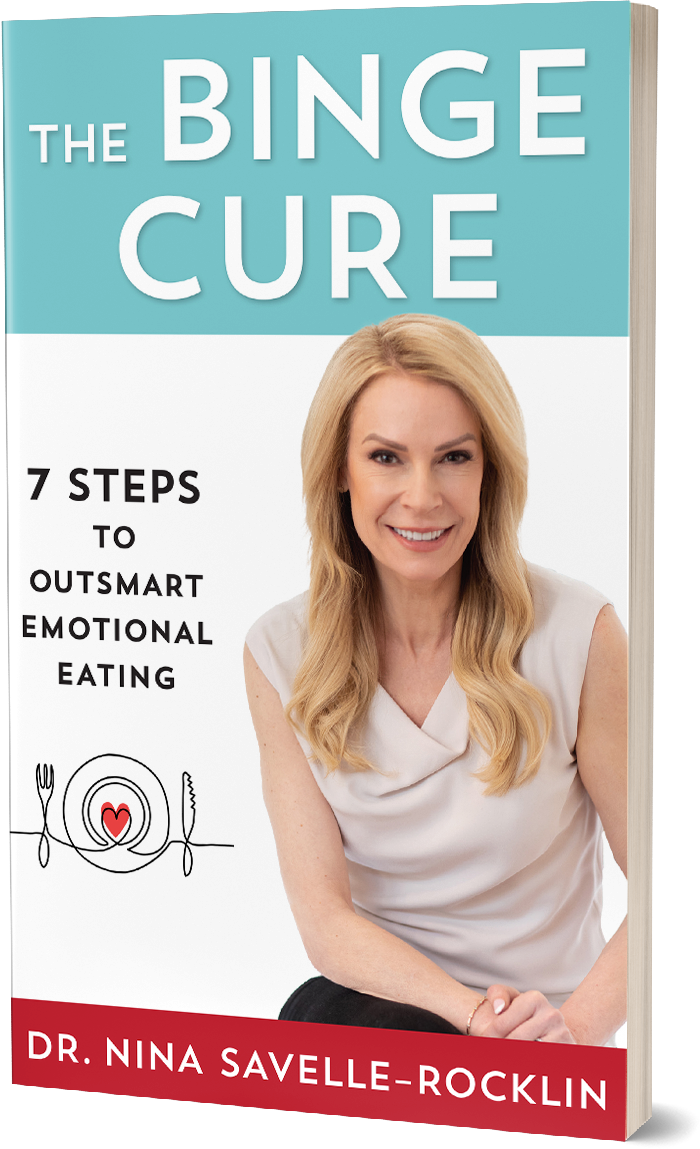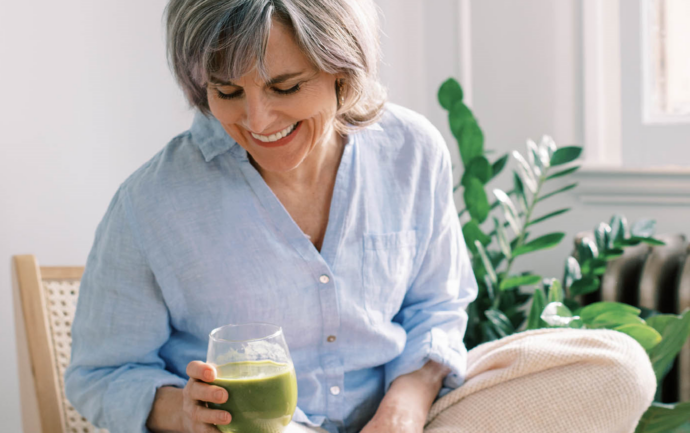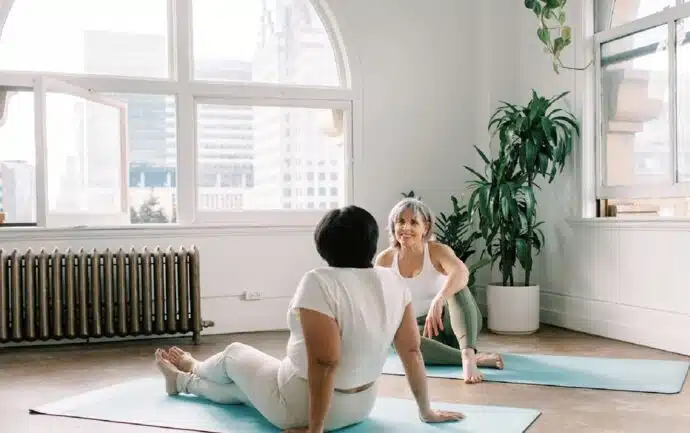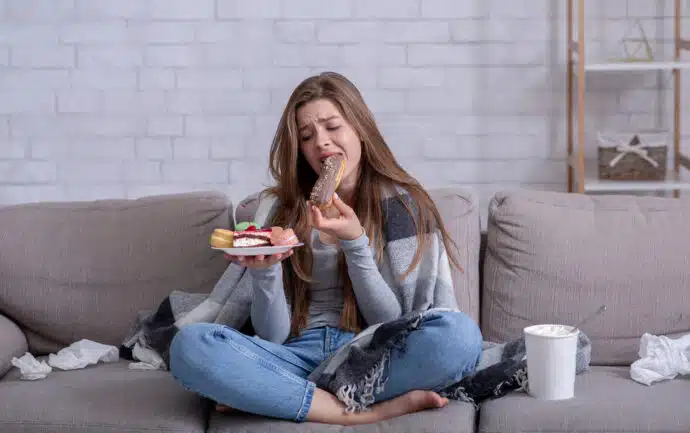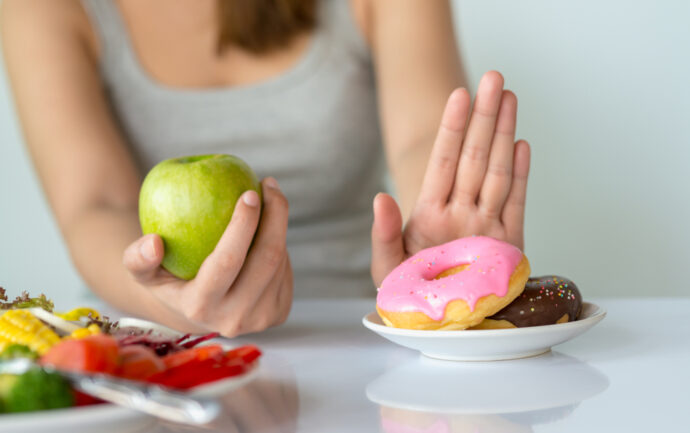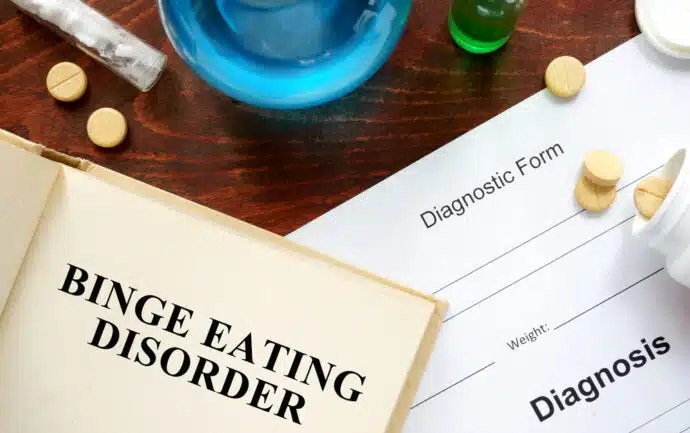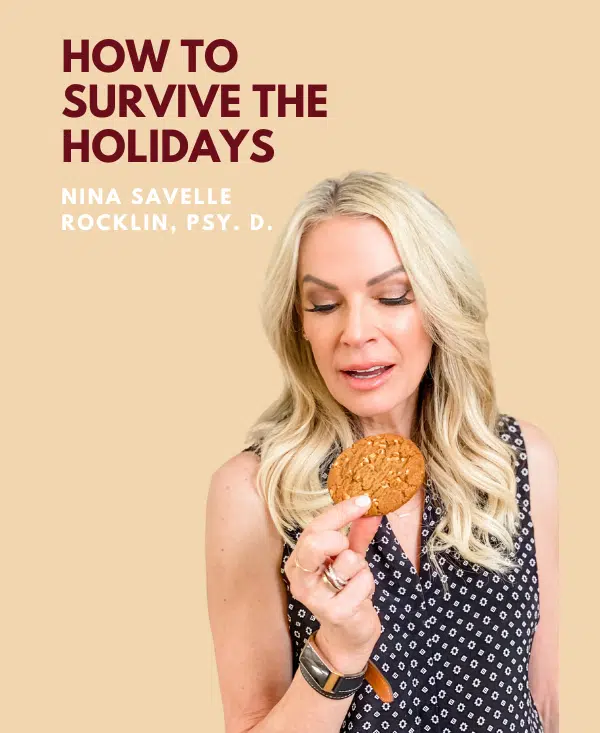Dr. Nina Savelle-Rocklin
Fat is Not a Feeling: Unlocking the Hidden Meaning of Body Language
Table of Contents
Have you ever mindlessly reached for a snack or comfort food when you’re feeling stressed, anxious, or bored? If so, you’re not alone. Many people eat as a source of comfort, distraction, and emotional regulation.
What’s important to recognize is that when you’re turning to food, you’re turning away from something else. There’s usually an underlying reason for eating, whether it’s dealing with difficult emotions or confronting a challenging situation.
So, the next time you reach for that bag of chips or pint of ice cream, take a moment to ask yourself what’s eating “at” you. That can be challenging because we get so adept at using food to distract and cope that sometimes we don’t know what our emotional or situational triggers are.

One way to discover our hidden truth is by interpreting the meaning of our language.
“I feel fat”
Eva and her friend were trying on jeans at a local boutique. After trying on a pair of jeans that were too tight, Eva got upset. She told her friend that she “felt fat” and was angry at herself for letting herself get to this point.
Here’s the thing: feeling fat isn’t a feeling at all. It’s code for some deeper emotion or thought that remains hidden. In Eva’s case, she was having a tough time at work and was upset that her boss had denied her a raise. She felt resentful, sad, and powerless.
For Eva, “feeling fat” was a way for her to express feelings of anger, anxiety, and stress. By focusing on her body and appearance, she distracted herself from that deeper emotional pain.
This is a common pattern for people who struggle with food and body image issues. “Feeling fat” can be a code for other thoughts and emotions. By acknowledging and addressing the underlying emotional issues, such as stress, anxiety, or relationship problems, Eva began to heal and feel better.
For other people, “feeling fat” expresses a fear of being too much to handle, or feeling guilty for taking up space literally and figuratively. For example, Helena was often told that she was “too emotional” and “too sensitive” and “a lot to deal with.”
For her “feeling fat” was a way to express her fears and anxieties about being too much for others to handle. She wanted to make herself less visible in order to avoid being a burden or attracting unwanted attention.
By building up her self-confidence and learning to take up space in a healthy way, by speaking up and being heard, Helena learned to value herself.
She set boundaries, asserted herself more in relationships, and practiced self-care and self-compassion. She challenged the notion that she was a burden and started living a more fulfilling life.
The key to translating “feeling fat” is to ask yourself what emotions and thoughts you might be avoiding and pushing away. As you work through these emotions, you’ll move closer to achieving true food freedom. This means no longer feeling controlled by cravings or emotional eating and enjoying a healthier, more balanced relationship with food that nourishes both your body.
“I’m so full it hurts”
Mark often ate until he was uncomfortably full and in pain. He had been feeling lonely and disconnected from others, and struggling with a sense of emptiness that he can’t seem to fill. Bingeing was a way of symbolically filling the emotional void that he’s been feeling. By consuming large amounts of food, he was to replace the emotional emptiness and loneliness with physical fullness and satiety.
By focusing on his physical discomfort, he momentarily forgot about the heartache of loneliness. And, by eating until his body hurt, he was unconsciously turning the emotional pain of loneliness into physical pain.
If you ever eat until you’re in pain, it’s important to ask yourself what’s hurting your feelings. Sometimes we use food to fill an internal void or distract ourselves from emotional pain. We may even turn the ache of loneliness into physical pain, because it’s easier to manage and get rid of.
Once you recognize and process these hidden and painful truths, you can finally break free from the cycle of coping, distracting, and numbing with food. It’s all about honoring your truth, even if it’s painful.
Loneliness can be challenging, but there are strategies you can use to cope with these feelings and create meaningful connections with others. One approach is to focus on building a support network of people you can turn to in times of need. This might involve reaching out to old friends you’ve lost touch with, or joining clubs or organizations that align with your interests.
Another strategy is to practice self-compassion and self-care. Take time each day to do the activities you enjoy, such as reading, listening to music, or going for a walk. Although this doesn’t resolve the loneliness, it can make it more bearable.
Turning loneliness into solitude is another important strategy. Loneliness and solitude are two related but distinct experiences. Loneliness is a feeling of disconnection or isolation from others, and it’s felt as sadness, yearning, or longing for a connection that isn’t there. Loneliness is a state of isolation and disconnection from the world.
Loneliness is a common and normal experience. Rather than trying to suppress or deny these feelings, try approaching them with curiosity and compassion. Acknowledge your emotions, and learn to respond to yourself in a kind and compassionate way, instead of symbolically filling the emptiness with food.
Solitude, on the other hand, means being intentionally alone with a comforting and soothing part of ourselves. It can be a positive and restorative experience that allows us to reflect, recharge, and connect more deeply with ourselves.
While loneliness and solitude are distinct experiences, they are not mutually exclusive. It is possible to feel lonely in a crowded room, and it is also possible to experience solitude while surrounded by others. Ultimately, the difference between loneliness and solitude comes down to the experience of each state: loneliness feels painful and solitude feels peaceful.
“My clothes are uncomfortable”
Have you ever felt uncomfortable in your clothes? Maybe your work clothes feel too tight and restrictive, while your casual clothes feel much more relaxed and comfortable.
That’s exactly how Sabrina felt. She didn’t want to buy new clothes that fit better – instead, she desperately wanted to lose weight. Every time we talked, she’d complain about how uncomfortable her clothes felt, especially how tight her pants felt around her waist.
I couldn’t help but wonder if there was something deeper going on. I asked what in her life wasn’t a good fit?
Sabrina wasn’t so sure. “Not everything has to have a deeper meaning,” she said. “Sometimes tight clothes are just tight clothes.”
And she had a point – sometimes, things really are just what they seem. Even Sigmund Freud purportedly said that sometimes a cigar is just a cigar, and not a phallic object. I asked her to humor me and think about where in her life she might feel constrained or uncomfortable. It turned out that her work situation was causing her stress and anxiety.
She had a demanding and hectic schedule, working for a company where the corporate culture wasn’t a good “fit” for her personality. By talking about the tightness of her clothes, she was actually expressing how uncomfortable she felt in her career.
Once we started exploring this symbolism, Sabrina felt an enormous sense of relief. She expanded her world, enrolling in an art history class and eventually left her job for one that was a good fit. Once she stopped eating for comfort and started focusing on the root problem, she stopped bingeing and her weight normalized.
Feeling physically “uncomfortable” can refer to a range of different emotions, from anxiety and tension to restlessness and embarrassment. By being curious about what makes you physically uncomfortable, you can start figuring out what’s really going on inside. Once you can identify the root problem, you can create changes that will make a difference.
For example, if anxiety is causing your stomach ache, try practicing relaxation techniques like progressive muscle relaxation and deep breathing. Also, recognize the thoughts that lead to anxiety. If you’re worried about what might happen in the future, stay focused on what you know to be true in the present.
If feelings of sadness, helplessness, and depression are behind your uncomfortable feelings, it’s important to develop strategies for coping. This involves recognizing and expressing your pain, instead of trying to make yourself feel better. Although the goal is to be free of these painful emotions, trying to force hope can backfire.
As counterintuitive as it may seem, acknowledging and validating how horrible you feel is actually an important first step toward healing. Then, cultivate a kind response to yourself by responding to yourself as you would to a friend or loved one.
“That hurts to think about”
Alice’s divorce had been final for a year and she was starting to think about dating again. But the thought of going out with someone new gave her a headache–literally. Dating in the 21st century was a whole new experience, and Alice was overwhelmed.
The last time she sought a relationship, there were no dating apps or swiping left or right.
When you have a physical headache, you can take a Tylenol or an Advil and the pain will eventually go away. But with painful thoughts, it’s a different story entirely.
Alice’s headache wasn’t going away, because the idea of dating was just too painful. What if she didn’t know the rules? What if she met someone who didn’t like her kids? What if her heart was broken again? All of these thoughts gave her a headache.
So what did Alice do? Every Saturday night, she holed up in her apartment to eat ice cream and snacks. But as we talked through her dating anxieties, she went out more and met new people. And eventually, she started having fun and going out instead of staying home with Ben & Jerry’s. As a result, she stopped bingeing and felt great.
Our words can tell us a lot about what’s going on in our minds. When we say “I feel fat,” it could be a sign that we have the sense that our emotions are “too much” or that we’re taking up “too much” space in the world. If we say “I ate so much my stomach hurts,” it might show we’re trying to fill an internal void or that something is missing in our lives.
Similarly, if we feel as if our clothes are tight and uncomfortable, it could be a sign that we’re feeling trapped and uncomfortable in some area of our lives. And when we say “just thinking about it gives me a headache,” it could be a clue that there’s something too painful to address in our lives. By paying attention to the underlying meaning of these statements, we can gain valuable insights into our own inner world.
And, by identifying and processing our underlying emotions and conflicts, we create greater resilience, well-being, and overall satisfaction in life. When that happens, we don’t use food to cope.
Ready to transform your relationship with food?
Join Dr. Nina's newsletter and receive:
• Expert tips on overcoming emotional eating
• Strategies for sustainable weight loss
• Exclusive content not found anywhere else
Don't miss out on the latest breakthroughs in binge eating!
The Author
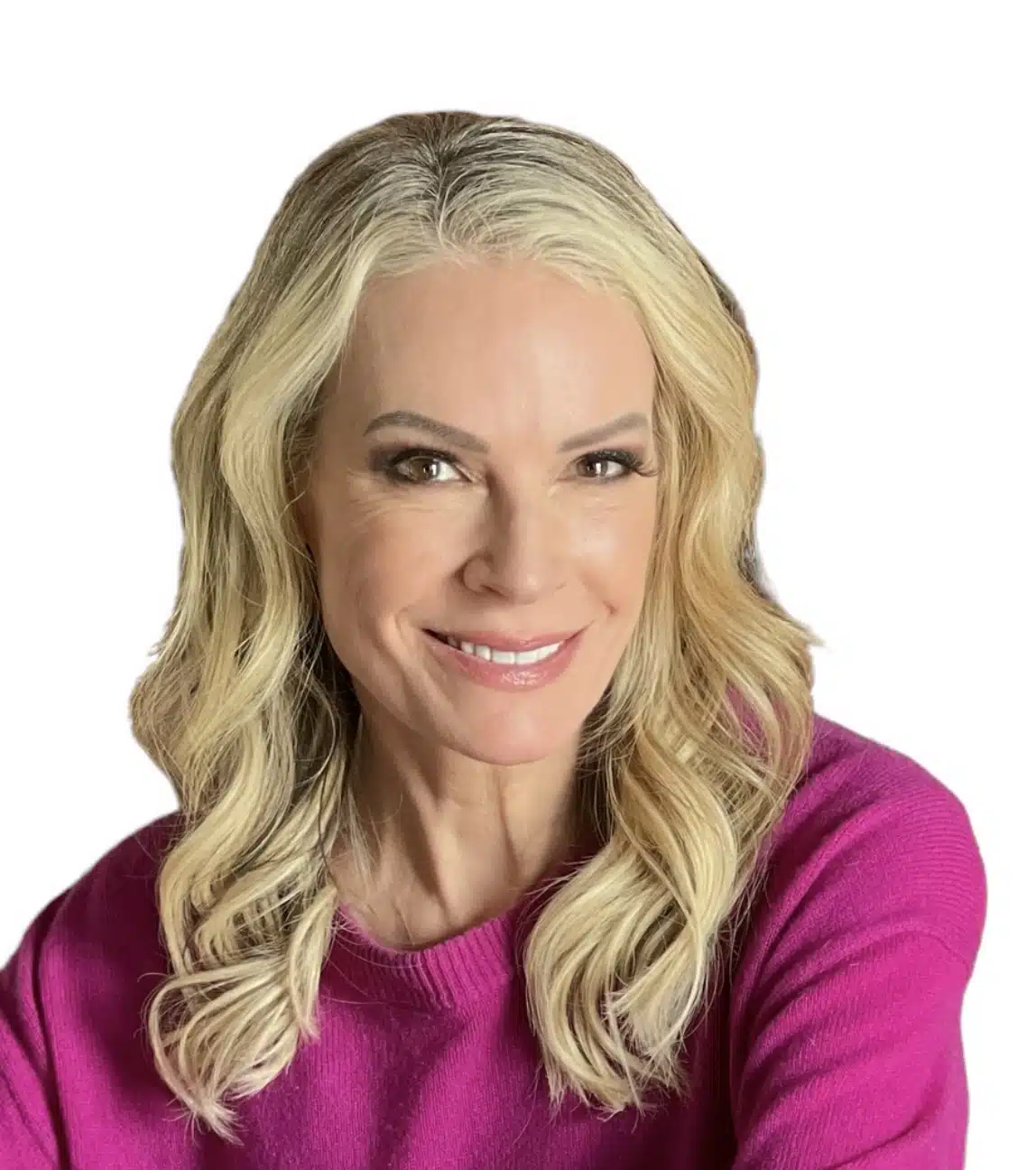
Dr. Nina Savelle-Rocklin is a renowned author and podcast host and one of the nation’s leading psychoanalysts known for the psychology of eating. Her signature message of, “It’s not what you’re eating, it’s what’s eating ‘at’ you” has resonated with hundreds of thousands of listeners from around the globe in 40 countries. As founder of The Binge Cure Method, she guides emotional eaters to create lasting food freedom so they can take back control of their lives and feel good in their bodies.
Related Blogs
